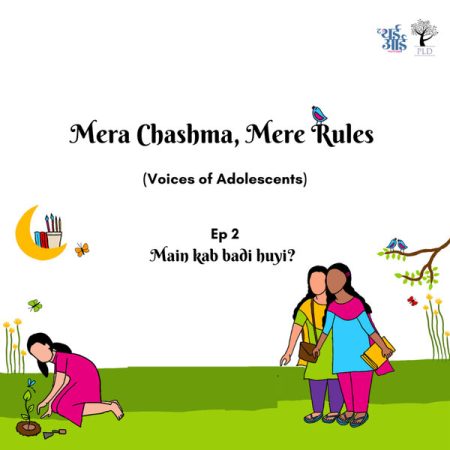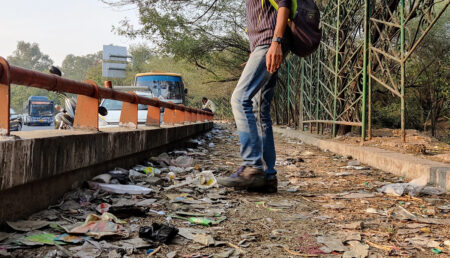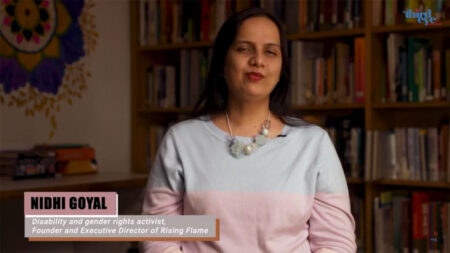I am a 23-year-old student from Haryana, who studied at Delhi University (DU) for her BA, and at Jawaharlal Nehru University (JNU) for her MA. Over time, I have found that education is something I hold absurdly close to my heart. Despite growing up in a relatively financially secure household, with slightly liberal parents, the kind of character development I could value for myself and those around me came not from socialisation back home, but rather from my education. When I was in school, I made the effort to educate myself far beyond the syllabus through the internet—mostly around issues of feminism, sexuality and bigotry. I came to college for my BA with this nascent understanding of various political matters, and it was there that my world underwent a drastic change.
At DU, I studied History and Political Science, and was fortunate enough to be taught by professors who cared about what they taught us. The sheer force of their teachings left a lasting impression on me. We learned the very real ramifications of what we were studying—whether it was the revelation of the colonial administration’s influence on how we came to communalise our own history or the now seemingly simple notion that there is no one way to be a feminist. This enabled, if not empowered, me to confidently deal with the world around me and to pass on this knowledge and the values that underpin it to others. It enriched my self-understanding in ways I could have never expected.
The North Campus of the university is made up of a cluster of just over a dozen colleges, along with guesthouses, hostels, administrative buildings, and the postgraduate departments (the Arts and Science Faculties) that are central to cross-college activities and mobilisation. Thousands of students from across the country come together to this open campus, mostly living in rented flats and paying guest accommodations (PGs) in neighbouring localities. In many ways, DU offers something close to the liberal vision of a university as a place of engagement where people from all walks of life are around each other, offering not just formal education but also the opportunity to move beyond what one already knows and holds to be true. Of course, there are glaring flaws in the model too. They range from issues of funding and infrastructure, reliance on school grades for admission, and discrimination in classrooms. At times, these issues foment difficult struggles. The only thing that prevents you from giving up entirely is the existence of a community of people who care about you as an individual as well as a social being.
The collective makes it seem possible and even worthwhile to stick around in the hope of engendering some change.

Urgent concerns
I went from being someone who was very suspicious of public education, for vague reasons about bureaucratisation and stagnation of public institutions, to someone who now feels that the struggle to keep public education alive is one of the most urgent concerns today. The way to challenge this has to be through a strengthening of the public education system, which enables people from all walks of life to come here and find it possible to not only be better educated for employment, but also to find the possibilities for their own personal and social liberation.
In this context, one has to say that the National Education Policy (NEP) has emerged as a game-changer, bringing about many defining changes in the higher education system and constituting a learning experience starkly different from mine. In higher education, there has been a move to invite private entities and investors to set up private universities, and a shift to opaque central bodies to govern and manage public educational institutions. Even as claims are made to preserve the “autonomy” of institutions, competitive entrance exams are in the hands of the newly formed National Testing Agency (NTA). Questions about its expertise and efficiency remain unanswered. Meanwhile, the online mode of learning is being widely endorsed. While many of these changes have not yet been brought in, the little appetisers we have tasted are worrisome.
The pandemic and the NEP signal, in my mind and in those of my peers, a watershed in the higher education scenario. I spoke to some of my friends and the following accounts reflect our collective sentiments.
Extremely online
Three of the four semesters of my MA programme took place online, as did parts of the fourth. We barely knew our classmates or professors, let alone seniors, juniors, office staff and workers. The campus was a desperate, faraway dream. The reality of our MA was Google Meet “classes” in the morning. For a young adult only beginning to find some direction in life, this was intensely jarring. The hope that a community usually inspires in its members was not to be found anymore.
The UGC’s concept note on Blended Learning suggests 70 per cent online learning for a programme in a semester as “desirable standards”, while the minimum requirement remains 30 per cent each for online and face-to-face learning. But it seems to forget one important detail—that students cannot read books and write long assignments with citations without laptops. By our second semester, some of us started crowdfunding to raise money for fellow students who did not have laptops. Even so, by the end of the degree course, at least a dozen students had dropped out. Nobody cared enough to do anything. Many times, I considered dropping out too, but could not stomach the idea of writing entrance exams for another cycle again.
Umara, my classmate in both BA and MA, says, “The most jarring experience of taking my final exams in online mode and then starting MA through the same, made me realise how big a role the university plays in facilitating the solitary experience of studying. Without the space of libraries, classrooms and even photocopy shops, it became extremely alienating. Other spaces of support like societies and political groups were also absent at this time. Regarding rigour, there is little hope of securing a good education at this moment.”

Alone on campus
Newer students in DU are being deprived of a meaningful environment to explore academics, themselves, and the society they live in. They are missing out on the kind of character-building that we experienced. Ashwin, an English undergraduate student, points out how his batchmates are suffering because of these developments, “The workload is so much. The general consensus is that you don’t have these spaces to voice your dissatisfaction or your dissent anymore, because everyone is standing on such fragile ground with the administration.”
Pratham, a first-year Political Science student, says, “Many of my friends simply didn’t join any of the societies because they were unsure if they could balance society work with their studies. If we were to spend all our time chained to our study tables poring over unfathomable texts, why did we even come to college? You’re depriving us of something very valuable.”
Contrasting this with her pre-pandemic BA, Supriya says, “I felt those three years were for me to experiment and engage with whatever I want to learn and understand (theatre and politics in my case) and be certain that it would contribute to my growth. That’s what education is for. This was liberty. I’m not saying it was utopia; but still, there was a physical space where students and workers could come together. Post-2020, during my MA, I felt alienated from my peers and had no idea what was going on in other spheres of university life. Each element of what makes a university/college feels isolated now.” Relationships with professors that formed an important part of college, both for academics as well as activities outside of it, are almost non-existent now, she adds.
Many of us were used to the tutorial system, where, apart from regular class lectures, we also attended weekly sessions in small, assigned groups with our professors. In tutorials, we could discuss assigned readings, engage with topics in greater depth, discuss our future plans and learn from our professors’ experiences. Those of us expecting a more rigorous form of this during our Master’s degree were sadly disappointed by it in the online mode. Supriya observes, “Tutorials made a difference when it comes to professors facilitating a text for us. It was a very intimate space that gave me no option but to interact and engage.”
In line with the NEP, the University of Delhi has increased the number of papers in each semester for undergraduates. Pratham asks, “Let us for a moment assume that having seven papers is good. The extra papers—value-added course and skill enhancement course—didn’t really serve their purpose. Their prescribed readings didn’t come till the last moment. Their classes weren’t regularly held and given how incompetent DU is, there was no clarity on how … these papers [will be evaluated]. Even for our core papers, it is haphazard and unmindful. We’re being taught a paper that was earlier taught to third-years.” Ashwin says, “One week before our semester got over, they introduced continuous evaluation schemes, and we got dumped with more work after we left for preparatory leave. They didn’t tell us what our exams would be like. We still have no clue what the pattern is.”
The very idea of time has changed for students, along with the possibilities of what one could do with that time. In a situation like this, where students are so demoralised, confused and left to deal with an absurd mess (like last-minute restructuring of the syllabus for first years) on their own, who do they turn to?
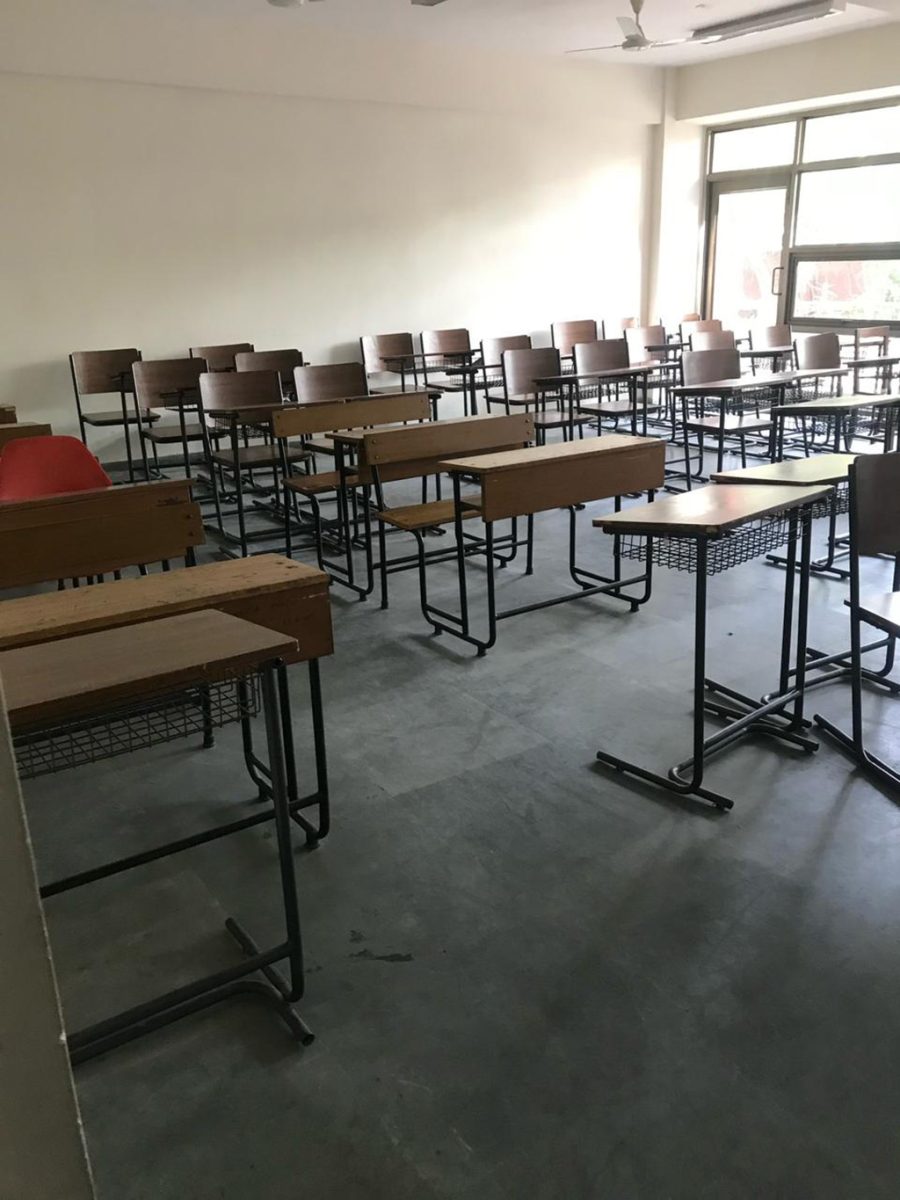
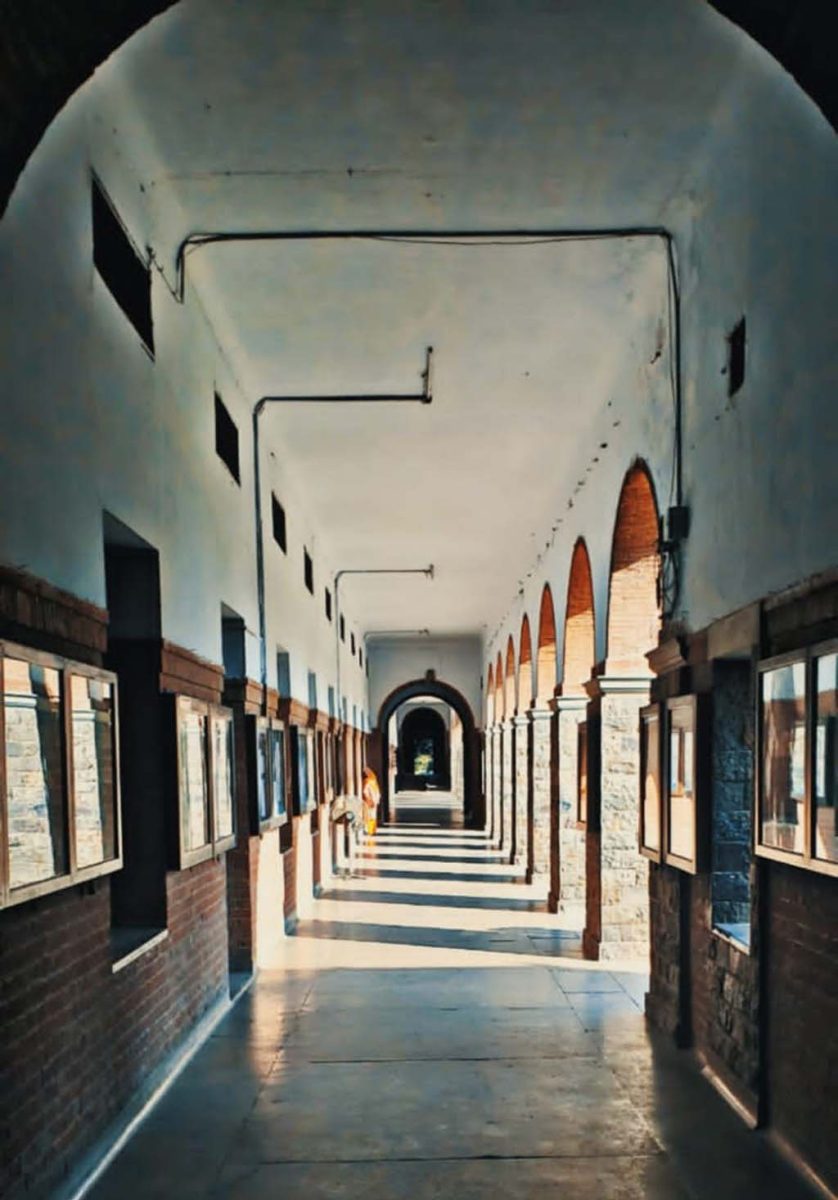
The discontinuation of the MPhil degree and reduction in PhD seats in universities have also resulted in a smaller student community on campuses. As Ashwin points out, “A huge reason why we’re all slowly becoming so politically immobile and inexperienced is the way academic calendars work. Now there’s always some batch that’s on leave because they have exams. All of us are not in that physical space together.” The bonds that one could forge with others on the basis of shared struggles seem difficult to come by now.
Opaque entity
The National Testing Agency (NTA) set up in 2017 eventually held the entrance exam for postgraduate courses at Jawaharlal Nehru University in October 2020, and the 2020–22 academic session began in January 2021. We had already lost too much time. The delay in holding entrance exams was understandable in 2020, but the NTA, to this day, has still not managed to stabilise the situation and cycle after cycle, exams like the Delhi University Entrance Test (DUET), National Eligibility Test (NET) continue to be delayed by many months. This delay in holding entrance exams by the NTA due to Covid led to the delayed start of the semester, especially for BA and MA first-year students, which in turn made the semester very short and caused deep anxiety both to the teachers and students. Even the December 2022 cycle for the UGC NET exam was only held in February-March 2023.
How can the academic community place any trust in this opaque entity, which has already made specialised higher education a game of chance, conducting MCQ (multiple-choice question) trivia entrance exams that have little to do with the actual acumen and suitability of a scholar?
After university
The academic classroom has been producing young, critical, intelligent minds who find that the current economy has no place for all of them, what with the shrinking of research opportunities, removal of scholarships, and the heavy emphasis in general on IT and management-oriented work, while social sciences and humanities remain neglected.
Supriya has this to say, “Even the NEP’s emphasis on skill development increased the fear that the economy and employment situations for young people right now are so heavily in line with these changes. So, I need to have a skillset I can market.”
Umara confesses, “The removal of MPhil has completely changed not only my personal plans but also the hope for a good PhD. You need time to figure out your research interests, which is almost impossible without MPhil. Now one has to go about doing different projects, facing the precarity of the job market to figure out things a university should be helping you with.”

Significantly, the DU ad hoc fiasco—where instead of heeding the teaching community’s basic demand to hire existing ad hoc professors in tenured positions, the university chose to let go of many of them who had worked for years—reveals the real professional and academic career prospects a student faces after leaving university.
Tellingly, 19,000 students from Other Backward Classes (OBCs), Scheduled Castes (SCs) and Scheduled Tribes (STs) dropped out from Central Universities, Indian Institutes of Technology (IITs), and the Indian Institutes of Management (IIMs) in the past five years.
My own personal, political and social, and at many times, intellectual journey during my Master’s could be summed up using words like deradicalisation, isolation, disenchantment. It is up to you to make things happen, or they never happen. And there’s only so much individuals can do. A conversation with a comrade reminded me that asking for a progressive learning space is not a demand that benefits the few. Strengthening public universities not only benefits those who want to skill themselves to be employable at workplaces, but it also creates room for intellectual stimulation for the sake of knowledge. My experience before the pandemic is something I will cherish forever. The (very real) possibility that this experience, which explained and also went beyond my own social locations may never be imparted hereafter, terrifies me.



